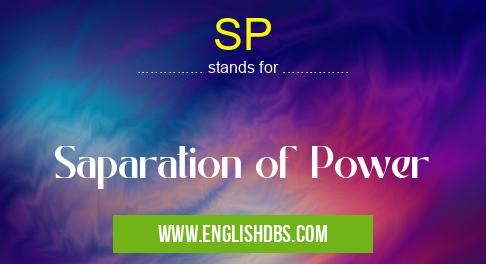What does SP mean in POLITICS
Separation of Powers (SP), a fundamental principle of modern democratic governance, ensures that the three primary branches of government—executive, legislative, and judicial—operate independently with distinct roles and responsibilities. This separation prevents any one branch from becoming too powerful and preserves the balance of power necessary for a just and fair society.

SP meaning in Politics in Governmental
SP mostly used in an acronym Politics in Category Governmental that means Saparation of Power
Shorthand: SP,
Full Form: Saparation of Power
For more information of "Saparation of Power", see the section below.
» Governmental » Politics
SP in Governmental Context
SP is enshrined in the constitutions of many democratic nations. In the United States, for instance, the concept is reflected in the principle of checks and balances:
- Executive Branch (President): Enforces laws, conducts foreign policy, and appoints officials subject to legislative approval.
- Legislative Branch (Congress): Makes laws, declares war, and approves presidential appointments.
- Judicial Branch (Courts): Interprets laws, resolves disputes, and exercises judicial review.
SP Full Form and Meaning
Separation of Powers (SP) is the full form of the abbreviation SP. It refers to the division of governmental authority into distinct branches to prevent the concentration of power in any single entity.
Essential Questions and Answers on Saparation of Power in "GOVERNMENTAL»POLITICS"
What is the Separation of Powers?
The Separation of Powers is a constitutional principle that divides the government's power among different branches to prevent any one branch from becoming too powerful.
What are the three branches of government under Separation of Powers?
The three branches are the legislative branch (makes laws), the executive branch (enforces laws), and the judicial branch (interprets laws).
How does the Separation of Powers prevent tyranny?
By dividing power among different branches, no single branch can have absolute authority, making it harder for a dictator or tyrant to emerge.
What are some examples of the Separation of Powers in action?
The U.S. Constitution gives Congress the power to make laws, the President the power to veto laws and enforce them, and the Supreme Court the power to interpret laws and declare them unconstitutional.
Why is the Separation of Powers important?
The Separation of Powers is essential for maintaining a balance of power and protecting individual rights by preventing any one branch of government from dominating the others.
Final Words: SP is a cornerstone of modern democratic governance. By dividing power among different branches, it ensures that no one branch can dominate the others, protecting individual rights, fostering accountability, and preventing tyranny. SP has played a crucial role in shaping the political landscape of democratic societies around the world.
SP also stands for: |
|
| All stands for SP |
